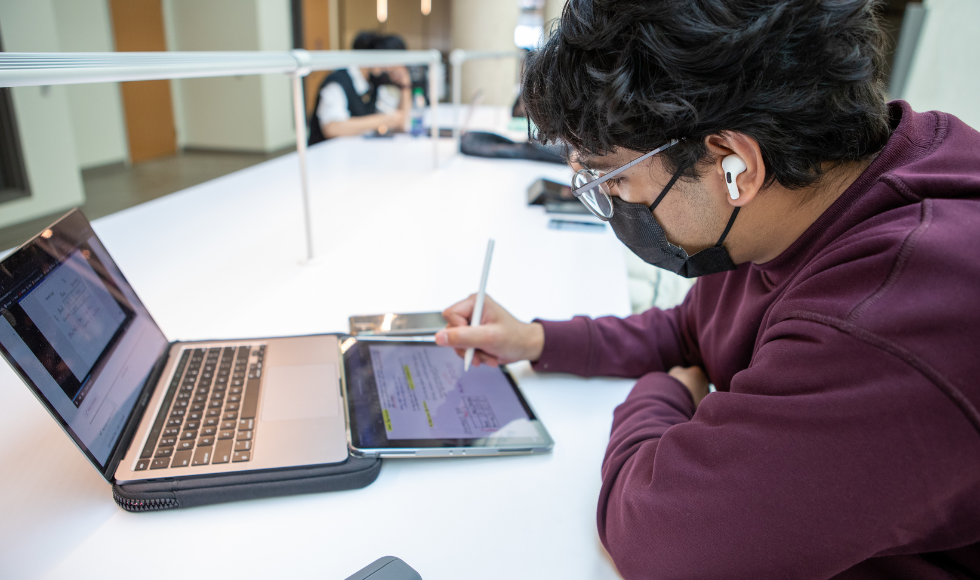Ask a McMaster expert: Answers to your COVID-19 questions

Health and safety continue to be a top priority for McMaster as we head towards the fall term. University faculty who are experts in virology and other health fields continue to guide our decisions in response to the ever-evolving COVID-19 pandemic.
As we get set to begin a new academic year, we asked McMaster experts Fiona Smaill, a professor of infectious diseases and microbiology, Dawn Bowdish, an immunologist and professor of medicine, and Dominik Mertz and Zain Chagla, associate professors of medicine, about the steps we can take to mitigate risk and avoid infection.
Topics:

(From left to right) Fiona Smaill is a professor of infectious diseases and microbiology, Dawn Bowdish is an immunologist and professor of medicine, and Dominik Mertz and Zain Chagla are associate professors of medicine. All work in McMaster’s Faculty of Health Sciences.
Vaccination
What advice would you give to students, staff and faculty members wondering if they should get a booster shot?
Smaill: The benefit of the booster shot is going to be particularly important for those who have any risk factors for more severe COVID, including an older population and those with underlying health conditions. But there is benefit, particularly in reducing the severity of illness, for everyone. So, if there is a booster to be made available to you, then take it. Overall, we know that, at a population level, boosters decrease the severity of illness, the overall rates of transmission, hospitalizations and deaths. So, I recommend boosters for anybody who’s eligible and to follow the guidance of our experts.
Bowdish: Our current vaccines are very effective against new variants like Omicron, but for a more limited time than previous variants. Although having two doses will likely protect you from hospitalization and death, you are only protected from symptomatic infection for three to six months after you’ve had a shot. This means that it’s a great idea to get a booster before the start of the school year when we expect infections to be high. Having a recent vaccination can reduce the severity of symptoms and reduce the chances of having long-term consequences after infection.
For public health guidelines on vaccination eligibility, click here
We have seen public health advice around vaccination evolve. Why is that?
Mertz: The evidence around vaccines continues to evolve and will again with the availability of new vaccines targeting the Omicron variant that should become available in the next few months. Vaccines continue to be safe and the most effective way to protect ourselves from severe disease.
However, with the onset of Omicron, the effect of vaccines in preventing infection (and as such transmissions) has decreased significantly and this effect wanes within a couple of months after the last dose – though the protection against severe disease continues to last. Vaccine mandates were largely built around the rationale of reducing the risk of transmission but we are in a different situation now, thus the decision to continue to pause the vaccine mandate.
Chagla: When vaccines came out, there was a recognition that most of the community was still susceptible to infection and getting as much immunity as possible may reduce transmission, as well as severe disease. Third doses of vaccines were also seen to increase the immune response and add additional protection. However, with the emergence of the Omicron variant, vaccines are more limited in preventing infection (while still remaining excellent in preventing severe disease).
This pivot means that more optimal vaccine strategies targeted to the highest-risk populations (elderly, immune compromised, those living in long-term care) are likely to create benefits for health systems as compared to mass re-vaccination campaigns every few months. Adding to this is that a number of individuals who have recently acquired COVID-19 (50-60 per cent of the population) and the fact many of them also generate immunity from their infection. Both mean that every person is different in what is considered optimal vaccination.
Masking
Masking is still strongly encouraged on campus. What are some of the scenarios where people should consider wearing a mask?
Chagla: In higher transmission settings, such as crowded indoor settings, or where ventilation is poor, public transit and health-care settings. People should also consider masking along with staying home if they feel unwell as a method to prevent spread to others.
Mertz: First of all, people who feel most comfortable when wearing a mask or respirator should continue to mask. Nobody should be stopping or discouraging people from doing so — the goal is to have a community at McMaster that accepts individual choices when it comes to masking.
Scenarios when there is a higher benefit of masking include for people at higher risk of severe infections due to underlying diseases or advanced age, and in keeping with current public health guidance. For example, vaccinated people who are allowed to leave isolation on day five should mask until day 10 after onset of symptoms.
For more advice and guidance on masking, click here.
Managing risk
We’ll be entering cold and flu season shortly after we return to campus. What advice do you have for our community?
Smaill: We can be confident that the more general policies we have in place around COVID are going to be effective at mitigating the transmission of colds and flu. We’ll likely see an uptick in cases but recognizing the importance of staying home if you have symptoms and routine hand hygiene will always be relevant to protect from any cold and flu virus. We also have effective influenza vaccines that have withstood the test of time, so taking advantage of the opportunity to be vaccinated is always going to be another sensible addition to the things you can do to protect yourself and the community. As students and faculty, the most effective way to protect our community is to make sure we have good community vaccination against the flu.
Bowdish: Infections of all sorts are increasing as we socialize more and are expected to increase even more when we’re forced to socialize indoors. It’s important to stay vigilant against COVID-19. Some people have very mild symptoms but that means they’re likely to dismiss them as a simple cold. No one wants to spread this infection to friends and vulnerable members of our community so using rapid tests or, if available, PCR tests, will help keep us all safe. Ventilation is also extremely important in choosing well ventilated spaces to teach, learn and socialize, as it helps reduce the risk of infection. Wearing a high-quality, well-fitted mask is probably one of the best things we can do to prevent transmission and keep classes running with as few absences as possible.
For more information on McMaster’s ventilation plan for this year, click here.
What have we learned about COVID-19 over the last year to have us better positioned this fall?
Smaill: We’ve learned that vaccines work, and completing the recommended vaccine series is still important. We’ve also learned that we can lead normal lives – normal school lives, normal social lives – with COVID while still taking appropriate precautions in the right type of settings.
We’ve come to be more comfortable with recognizing that there’s always going to be some risk, so each individual needs to balance their risks. For example, ‘I will travel, but I will wear a mask.’ I think we have to embrace an environment where people are very comfortable making those types of choices.
At the same time, we still know that COVID is changing. We don’t know everything yet, but there are still plenty of opportunities for us to ask the right questions, get the best answers and modify what we do based on the evidence. Things will continue to change, and we just have to remain flexible and nimble on how we approach the uncertainty that still exists.
Bowdish: We’ve learned that masking works to reduce infections and to keep workplaces and schools running. We’ve learned that two doses of the vaccine are not sufficient to protect us from omicron and we need to shift from counting the number of vaccines we have, to thinking about how recently we’ve had them in order to maximize our protection at the beginning of a wave.
We’ve also learned that COVID isn’t over and that a wave with a new variant is almost inevitable this fall. But using simple tools like testing, masking in crowded settings and ventilating we can reduce the impact of this wave and keep our schools and workplaces open and running.
The mental health of many people has been affected by the pandemic. What is your advice to those trying to avoid infection while also taking part in in-person activities?
Chagla: Every person needs to make a judgment on how much risk they want to take. We are all social beings and want to be with others, and inevitably COVID is not going anywhere. People should consider their own health status and risk tolerance with the risks of acquiring COVID-19 and make appropriate decisions for themselves in how best to engage with life back on campus.
Back to Mac Updates, COVID-19 Updates, Health
